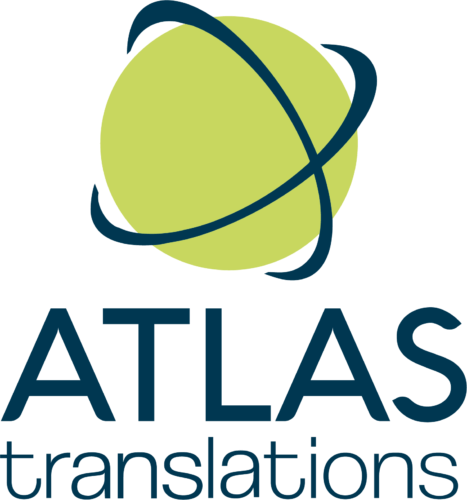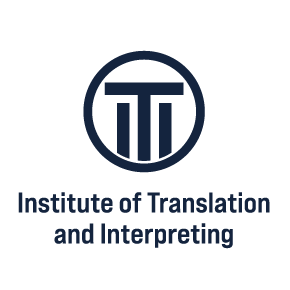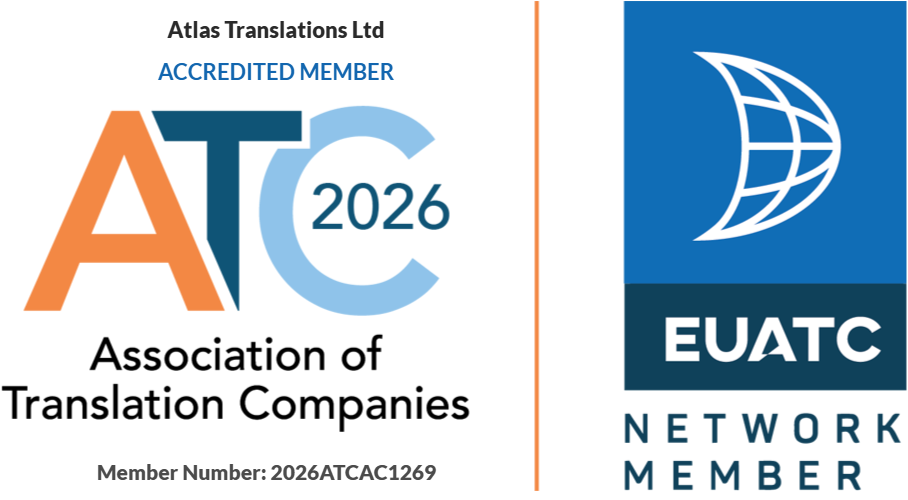Getting It Right in UK Healthcare: Identifying and Supporting Language Needs
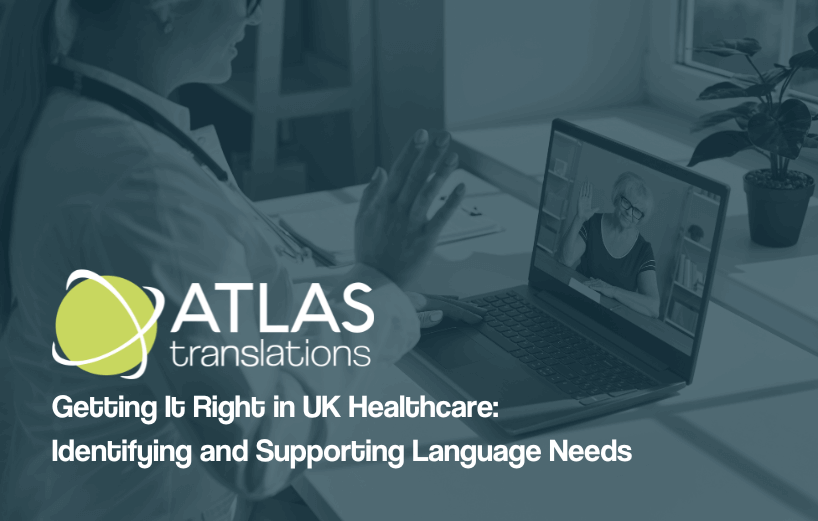
Clear communication in healthcare begins long before any tests are conducted, results reviewed, or treatment plans created. It begins with two simple, but often overlooked questions:
What language does this person speak?
How can we help them be understood?
In last week’s blog, we looked at why professional interpreting matters. Today, we’re zooooming in on two essential steps that help make those professional interpreting services work: identifying a person’s preferred language and offering interpreting support that builds trust.
Ready? Excellent, let’s take a closer look.
What do you need help with today? Call us on +44 (0)1727 812 725 or email us at team@atlas-translations.co.uk – we’re only a call, chat, or email away, and we’re always eager to help!
Identifying a Person’s Preferred Language
🤐 Not Everyone Can Tell You Outright
It sounds straightforward, doesn’t it? To just ask someone what language they speak. But in practice, it’s not always that easy. A patient may be nonverbal, in distress, or unsure of how to express their needs. Family members or caregivers might instinctively try to step in and answer on their behalf, which isn’t always helpful or accurate.
Getting it wrong can delay care, confuse diagnoses, or lead to using the wrong interpreter. That’s why language identification needs to be handled with care, not guesswork.
🔎 Using Language Identification Tools
So, if we (obviously) can’t guess, do we have to rely on our gut reactions, informal suggestions, or the ever-helpful “vibe check”?
Thankfully, the answer is no. Frontline healthcare staff at all levels have access to practical tools designed for just this purpose. Here are a couple:
- The National Register of Public Service Interpreters (NRPSI) offers a helpful Language Identification Chart, which features the most commonly spoken languages in the UK.
- The Refugee Council has created a nifty one-page downloadable chart covering 62 languages. It’s specifically designed to help refugees and asylum seekers indicate their spoken language, without even needing to speak.
- Here at Atlas Translations, we’ve put together a handy-dandy downloadable language guide that asks the non-English speaker to point to their native language, allowing for an interpreter to be arranged.
These charts often display languages in both English and their native script, making it easier for someone to point to the correct option. Some NHS Trusts even keep laminated copies on hand in A&E or reception areas.
It’s a small action with a significant impact. Taking the time to accurately identify a language can stop miscommunication in its tracks. It’s also a key part of improving UK healthcare language support across services.
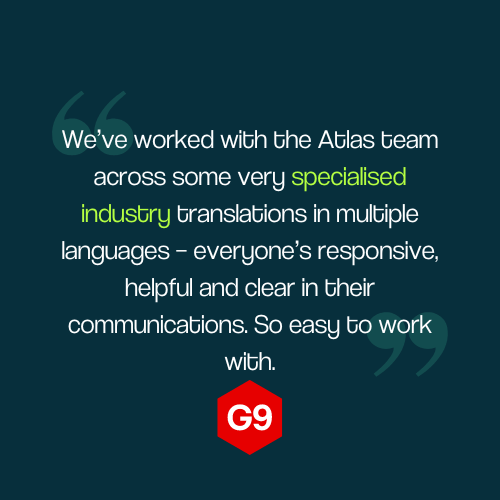
🌍 Don’t Overlook Dialects and Regional Varieties
Language identification doesn’t stop at “Spanish” or “Chinese.” Patients might speak specific dialects that require different interpreters:
- Castilian vs Andalusian – only two of the different Spanish dialects spoken in Spain
- Mandarin vs Cantonese – both are Chinese languages, but mutually unintelligible
- Farsi vs Dari – closely related but with key distinctions in pronunciation and vocabulary
- Somali – is spoken with regional variations that may affect mutual understanding
Where possible, check for dialect preferences or ask the patient (or their language advocate) to confirm what version of the language they’re most comfortable using.
The more accurate the match, the better the outcome for the patient and for UK healthcare language support efforts over time.
Offering Language Services That Support, Not Confuse
❓ Explaining the Why to Patients and Families
Even when interpreting services are available, not everyone knows they can (or should) use them. Some patients prefer to rely on family members or bilingual staff out of convenience or habit. Others may worry about being misunderstood or judged by a stranger.
That’s where resources like the Good Practice Guide from Migrants Organise come in. It offers practical information for patients and is available in English, Arabic, Bengali, and Somali, with Chinese available, but not online.
This is more than a “point at your language” chart, as it helps to explain to the non-English speaker:
- Why using a professional interpreter matters
- What they can expect during interpreting sessions
- How to request and use interpreting services with confidence
Helping people understand the why behind interpreting goes a long way in building trust and encouraging its proper use.
🏆 What Good Interpreting Support Looks Like
Remember that offering interpreting support isn’t just a box-ticking exercise. It should be delivered in a way that respects the patient and protects confidentiality.
That means:
- Using trained interpreters, not family members, children, or bilingual staff who aren’t qualified
- Briefing interpreters when possible, especially when sensitive or technical topics are involved
- Allowing space for private discussion, especially in gynaecological, mental health, or safeguarding scenarios
One of the most important aspects of UK healthcare is language support, as it builds a strong foundation for all future communications.
Professional interpreters understand how to navigate cultural contexts, medical terminology, and emotional nuances. They’re not just translating; they’re making sure nothing gets lost in translation.
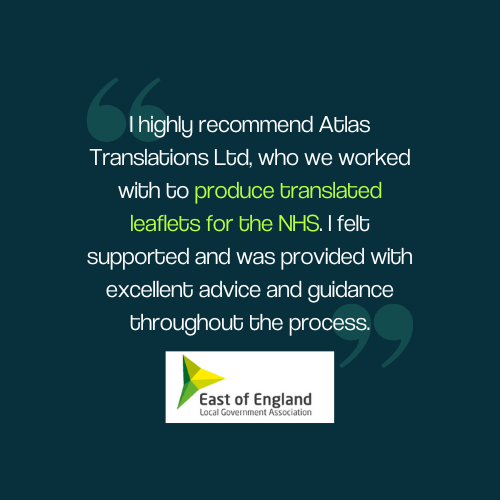
🗣️ Helping Patients Use Interpreters Effectively
For many patients, working with an interpreter is a brand-new experience. Healthcare professionals can make it smoother by:
- Pausing often to let the interpreter actually interpret; don’t rattle off full conversations without any breaks
- Speaking directly to the patient and not the interpreter. This keeps the focus on the person receiving care.
- Check for patient understanding, not just translation accuracy. If something seems unclear, offer clarification.
It’s all about making a space for genuine communication. A space where the patient feels seen, heard, and understood, not just translated.
Summary
Getting the language right from the start makes everything else easier. Tools like language charts and resources for patients are small but mighty helpers, but they’re just part of the picture. Having access to trained, reliable interpreters is what truly brings it all together.
That’s where Atlas Translations can help. We match healthcare providers with qualified interpreters who understand the importance of accuracy and clarity, while also considering the cultural context. Whether it’s arranging support in person, over the phone, or via video, we help you make sure that language never becomes a barrier to care.
With an open-minded approach, the right tools, and teams that care, UK healthcare language support becomes even more successful, setting the stage for safe and inclusive communication across every step of the patient journey.
Contact Us
We’d love for you to contact Atlas Translations! We’re always here for a chat or to answer questions!
Call us on +44 (0)1727 812 725 or email us at team@atlas-translations.co.uk to let us know what you need. We respond quickly to all enquiries!
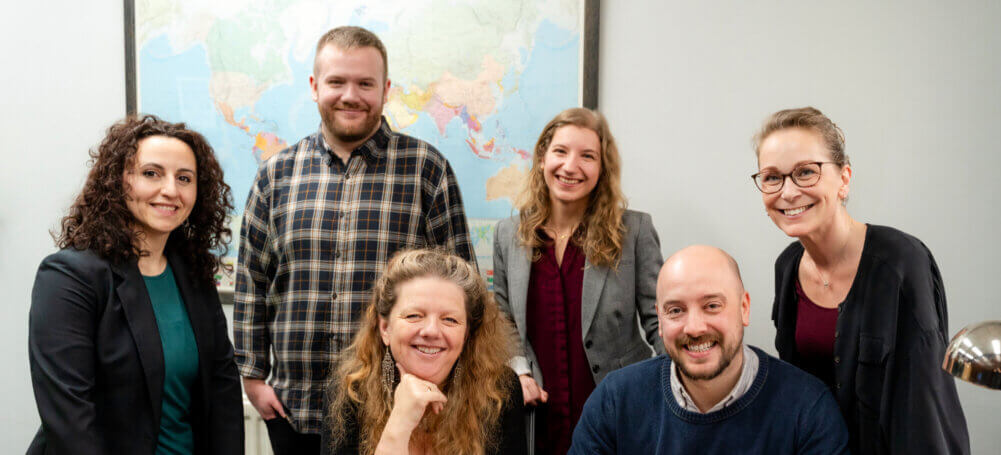
If you’d like to meet us face-to-face, learn more about our translation and language services, or deliver documents, please email or call us ahead of time to arrange a meeting.
Use the Live Chat option during UK working hours to ask any questions you may have. You’ll chat with a real, live human—we’re a bot-free zone! Click the little icon at the bottom right of your screen to begin chatting with us.
If you need a quick quote, we have a handy GET A QUOTE button located at the top of our website, where you can get an estimate for your needs.
Can I Trust Atlas Translations?
Absolutely, you can! But if you’re after something with a little more “facts and figures”, here’s some info:
Atlas Translations holds two ISO certifications: ISO 9001:2015 (Quality Management) and ISO 17100:2017 (Translation Services).
If the project is highly confidential, we can sign a non-disclosure agreement (NDA) for added peace of mind.
Are we up to date on privacy? Well, thank you for asking, and yes, we are! We registered with the Information Commissioner’s Office (ICO) over 20 years ago and have always placed a high importance on data protection.
You can read more about our commitment to quality here.
Atlas Translations takes pride in providing fast, friendly, and high-quality language services. But you don’t have to take our word for it. Click to read what our clients are saying about us.
We’re also on TrustPilot, and you can read our reviews here.
Global Voice, Local Touch
If you’re looking for some top tips for partnering with Atlas Translations, we have some top tips to share! We answer 25 of our clients’ most frequently asked questions, ranging from typesetting queries to discussing reference materials.
Click to download Global Voice, Local Touch
